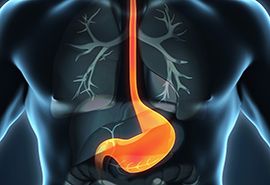


The stomach is an organ between the esophagus and the small intestine. It is where digestion of protein begins. The stomach has three tasks. It stores swallowed food. It mixes the food with stomach acids. Then it sends the mixture on to the small intestine. You have probably had a problem with your stomach at one time or another. Indigestion and heartburn are common problems. You can relieve some stomach problems with over-the-counter medicines and lifestyle changes, such as avoiding fatty foods or eating more slowly. Other problems like peptic ulcers or GERD require medical attention. You should see a doctor if you have any of the following: - Blood when you have a bowel movement. - Severe abdominal pain. - Heartburn not relieved by antacids. - Unintended weight loss. - Ongoing vomiting or diarrhea.